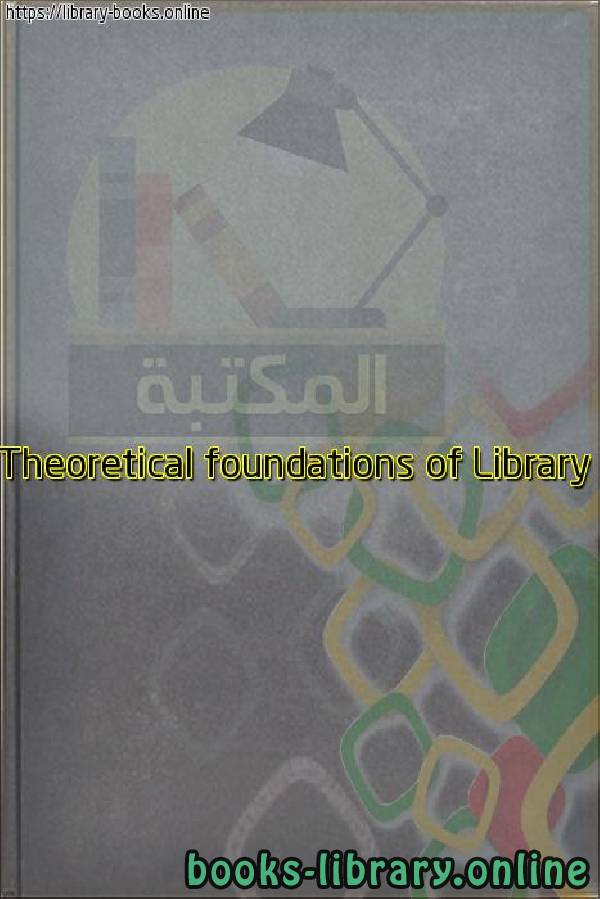📘 قراءة كتاب Theoretical foundations of Library and Information Science أونلاين


اسس تصميم المكتبات
Regarding the theoretical foundations of Library and Information Science (LIS), this paper develops ... 3. design sciences, which are the core of the sciences of the artificial4, to be ..... at
Theoretical foundations of Library and Information Science
An epistemological and methodological approach
Antonio BEREIJO
University of A Coruña, Spain
The context of an epistemological and methodological approach to LIS
Regarding the theoretical foundations of Library and Information Science (LIS), this paper
develops a new epistemological and methodological approach. The aims of this analysis work on
several levels: firstly, the scientific features of LIS as a « science » (i.e., language, structure,
knowledge, method, activity, ends, and values)
1
; secondly, the analysis of its characterization as
an applied science as its scientific orientation during research ; and thirdly, the consideration of
its status as artificial
2
rather than social
3
. These aims deepen in the epistemological and
methodological configuration of
Library and Information Science
, which in Spain is traditionally
called
Ciencias de la Documentación,
or more recently,
Información y Documentación
.
Library and Information Science, which today is commonly called « Information Science », can
be understood from two different viewpoints : the broad perspective and the narrow view. The
broad perspective involves the disciplines generally working on the aims, processes and results of
archives, libraries and documentation centres. Meanwhile, the narrow view focuses on specific
information processes such as : creation, acquisition, organization, evaluation, storage, retrieval,
and dissemination of information. In this narrow view, there is a particular interest in the users of
archives, libraries and documentation centres.
This paper analyzes the first option – the broad perspective – that involves a clear connection to
epistemological and methodological issues. In this regard, there are three levels :
1. science in general, which considers any feature present in science (either natural sciences,
social sciences, or the sciences of the artificial);
2. applied sciences, which take into account the features that distinguish them from basic
sciences;
3. design sciences, which are the core of the sciences of the artificial
4
, to be considered in the
realm of LIS.
Following these three steps, there are several sections. Firstly, the proposal analyzes LIS as
involving the features of all sciences (i.e. language, structure, knowledge, method, authority, ends
and values). Secondly, there is the study of LIS as an applied science, which involves the
consideration of tasks such as cataloguing, indexing, abstracting, etc. Thirdly, there is a reflection
on the specific status of these elements, which leads to the consideration of them as « artificial »,
insofar as they come from a design related to processes and results.
The scientific status of Library and Information Science in the broad sense
When analyzing to what extent a discipline such as Library and Information Science is scientific
in the broad sense, the first things to take into account are the features of the science. In this
Revue de l’Enssib • n° 1 • octobre 2013
1
حجم الكتاب عند التحميل : 582.8 كيلوبايت .
نوع الكتاب : pdf.
عداد القراءة:
اذا اعجبك الكتاب فضلاً اضغط على أعجبني و يمكنك تحميله من هنا:

شكرًا لمساهمتكم
شكراً لمساهمتكم معنا في الإرتقاء بمستوى المكتبة ، يمكنكم االتبليغ عن اخطاء او سوء اختيار للكتب وتصنيفها ومحتواها ، أو كتاب يُمنع نشره ، او محمي بحقوق طبع ونشر ، فضلاً قم بالتبليغ عن الكتاب المُخالف:
 قبل تحميل الكتاب ..
قبل تحميل الكتاب ..
يجب ان يتوفر لديكم برنامج تشغيل وقراءة ملفات pdf
يمكن تحميلة من هنا 'http://get.adobe.com/reader/'


 منصّة المكتبة
منصّة المكتبة